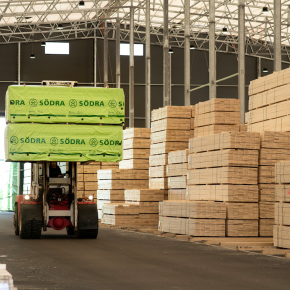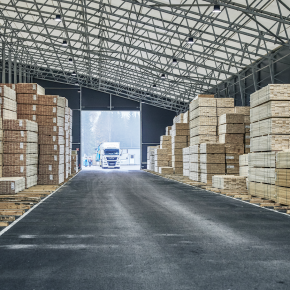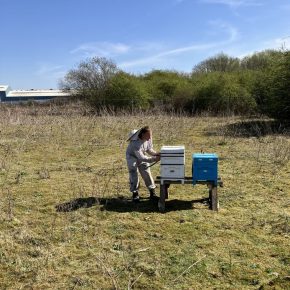
What’s next for the UK softwood timber market? Sodra discuss amidst Brexit uncertainty
So where now? Nigel Buckley-Ryan, UK Sales Director at Södra Wood Ltd, reflects on the current state of the softwood timber market and the UK outlook amid continuing Brexit uncertainty.
“The Brexit deadline of 29 March has been and gone and now we have a new end-of-October deadline. But, of course, no one knows whether we will actually leave the EU by this date and, if we do, what sort of a deal – if any – will be in place.
So, what’s the impact of this continuing uncertainty on the softwood timber market and what, if anything, can builders’ merchants do to protect themselves and ensure a continued supply of timber?
Let’s start by taking a step back and looking at what’s happening in the rest of the world. For, of course, timber is a global product and what’s happening in China or Canada can have a significant impact on UK prices.
Chinese demand currently low
The ongoing trade tariff dispute between China and the US is currently depressing Chinese demand for timber – this is because China typically imports wood to make toys which it then exports to the US.
Meanwhile, the major softwood timber-producing regions of Canada and Scandinavia remain under the shadow of the bark beetle. Significant extra harvesting of the white wood favoured by the beetle led to over-production in Swedish sawmills in the last two quarters of 2018.

This took some of the heat out of the market, but this is now priced in and, ultimately, log supply from these regions remains limited. Consequently, when demand picks up in the US, buyers will once more have to look for Europe for supply.
The big but volatile market in Egypt and North Africa is currently quiet following the sharp rise in prices in the second half of 2018. India, for its part, is starting to take volumes of softwood and is likely to be the next China, becoming a huge consumer of softwood.
Strong demand for construction timber in Europe
Turning now to Europe, European markets for construction timber remain buoyant and the UK in particular continues to need more homes, with a significant percentage of these being built as timber frame.
Globally, innovation remains a key driving force in the market. In particular, high-rise timber buildings are an increasingly popular, sustainable choice for urban construction, and many timber mills are developing CLT (cross-laminated timber) panel production for on and off-site manufacture of these buildings.
Softening of prices in UK after busy first quarter
If we now look in more detail at what’s happening in the UK, it’s clear that the preparations for Brexit and the missed March deadline have had an impact. In an effort to ensure that Brexit did not adversely affect supplies, importers took a responsible approach and brought in extra stock.
The Brexit non-event that followed meant that there were no delays and so the extra stock was not needed. Inevitably, the need to move this stock through the system has led to a softening of prices which, combined with rising distribution costs, is currently posing a challenge to importers.

However, on the price front at least, it’s likely that this will be a short-term issue. Prices have already started to firm in the States and demand may pick up in China too.
GBP has recently fallen in value some five per cent against the Euro and the Swedish Krona, so there will be a need for prices to recover as we head towards 2020.
Predicting with any great certainty what life for the timber industry will look like post-Brexit remains challenging. There is a chance, however, that importers will not bring in additional stock in preparation for the new deadline.
Therefore, come the autumn, a situation may arise whereby shipping delays lead to shortages.
Talk openly to your supply partner
So, what should you do if you’re a builders’ merchant? Can you, in fact, do anything? My advice is to take a long-term approach and remain loyal to your supply partner rather than play the market for short-term gain.
If there are shortages, importers will have to be selective about who they supply and clearly, they’re more likely to do business with those that have stuck by them than sell to merchants who suddenly start knocking at their door.
So, work closely with your supply partner and make sure they understand your needs. Now, more than ever, merchants who enjoy an open and trusting relationship with their supplier are best placed to understand and plan for the possible changes they may face.”
Founded in 1938, Södra is Sweden’s largest forest-owner association. Its 52,000 members own just over half of all privately-owned forests in southern Sweden. It also trades as an international forest industry Group, processing its members’ forest products.
Södra is one of the largest European suppliers of market pulp, and has one of the largest sawmill operations in Sweden. The Group’s operations span sawn and planed timber goods, paper pulp and biofuel.
Address: Södra Wood Ltd, Unit 18/19, Cirencester Office Park, Tetbury Road, Cirencester GL7 6JJ
Phone: +44 (0)1285 646000
Fax: +44 (0)1285 646020
Email: ukinfo@sodra.com
Visit Supplier's page
Latest news

30th April 2025
Digital Construction Week announces seminar programme for its landmark 10th edition
Digital Construction Week (DCW) returns to ExCeL London on 4 – 5 June 2025 with its most impactful programme yet. It brings together the best and brightest from across AECO, for two days of practical learning and idea sharing.
Posted in Articles, Building Industry Events, Building Industry News, Building Products & Structures, Building Services, Building Systems, Exhibitions and Conferences, Information Technology, news, Restoration & Refurbishment, Retrofit & Renovation, Seminars
29th April 2025
Senior pledges to ‘bee’ part of the solution with new biodiversity initiative
Senior Architectural Systems has installed its first on-site beehive, marking another step forward in its commitment to sustainability and biodiversity.
Posted in Articles, Building Industry News, Building Products & Structures, Building Services, Curtain Walling, Doors, Glass, Glazing, Innovations & New Products, news, Restoration & Refurbishment, Retrofit & Renovation, Sustainability & Energy Efficiency, Walls, Windows
29th April 2025
West Fraser range delivering key benefits for South-East carpentry company
An experienced carpenter and building site manager who has recently set up his own company is using high performance panel products from the West Fraser range.
Posted in Articles, Building Industry News, Building Products & Structures, Building Systems, Case Studies, Garden, Restoration & Refurbishment, Retrofit & Renovation, Sustainability & Energy Efficiency, Timber Buildings and Timber Products
29th April 2025
CPD Courses Available Online From Ecological Building Systems
Ecological Building Systems, a leading supplier of natural building products for sustainable construction, has revealed its comprehensive CPD programme for the year ahead.
Posted in Articles, Building Industry Events, Building Industry News, Building Products & Structures, Building Services, Continuing Professional Development (CPD's), Information Technology, Innovations & New Products, Insulation, Restoration & Refurbishment, Retrofit & Renovation, Seminars, Sustainability & Energy Efficiency, Training, Walls, Waste Management & Recycling
 Sign up:
Sign up: